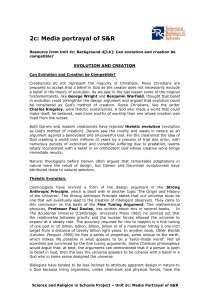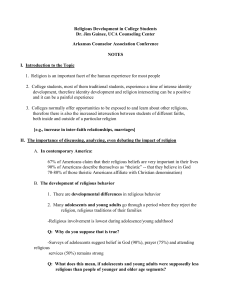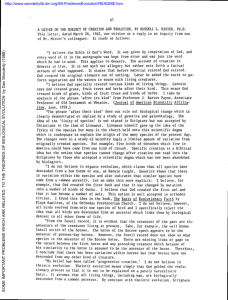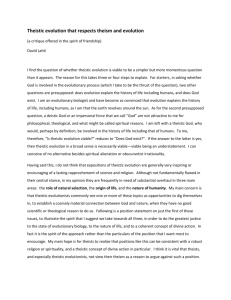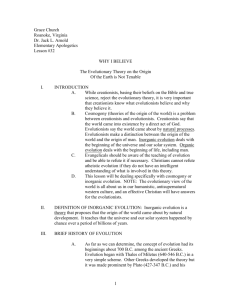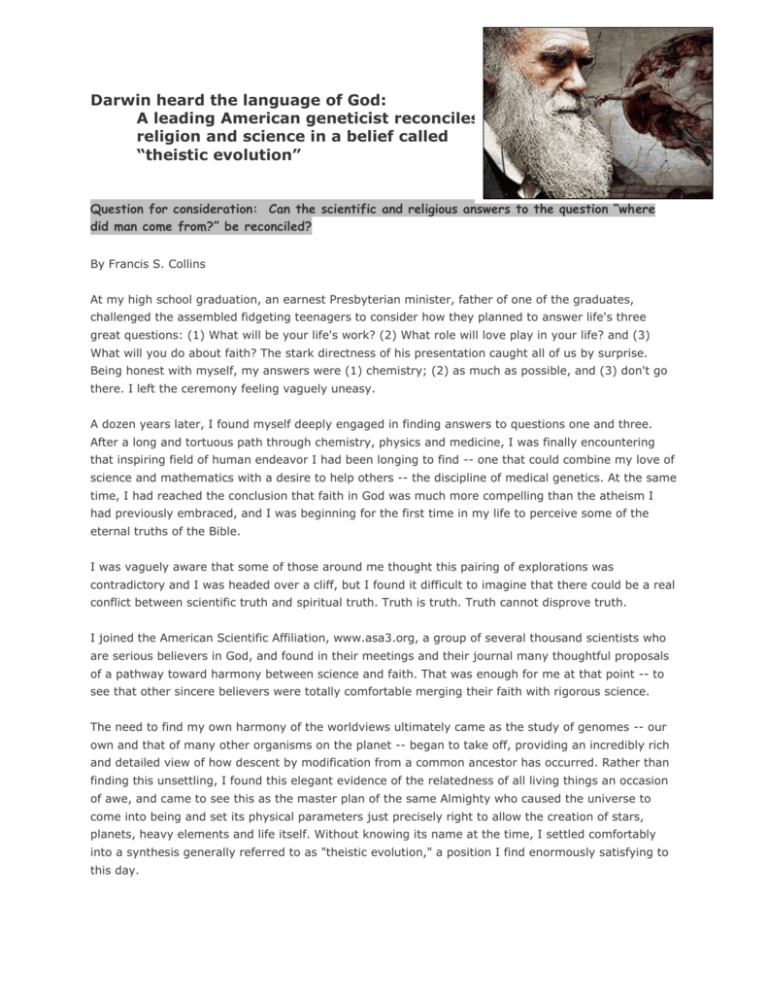
Darwin heard the language of God:
A leading American geneticist reconciles
religion and science in a belief called
“theistic evolution”
Question for consideration: Can the scientific and religious answers to the question “where
did man come from?” be reconciled?
By Francis S. Collins
At my high school graduation, an earnest Presbyterian minister, father of one of the graduates,
challenged the assembled fidgeting teenagers to consider how they planned to answer life's three
great questions: (1) What will be your life's work? (2) What role will love play in your life? and (3)
What will you do about faith? The stark directness of his presentation caught all of us by surprise.
Being honest with myself, my answers were (1) chemistry; (2) as much as possible, and (3) don't go
there. I left the ceremony feeling vaguely uneasy.
A dozen years later, I found myself deeply engaged in finding answers to questions one and three.
After a long and tortuous path through chemistry, physics and medicine, I was finally encountering
that inspiring field of human endeavor I had been longing to find -- one that could combine my love of
science and mathematics with a desire to help others -- the discipline of medical genetics. At the same
time, I had reached the conclusion that faith in God was much more compelling than the atheism I
had previously embraced, and I was beginning for the first time in my life to perceive some of the
eternal truths of the Bible.
I was vaguely aware that some of those around me thought this pairing of explorations was
contradictory and I was headed over a cliff, but I found it difficult to imagine that there could be a real
conflict between scientific truth and spiritual truth. Truth is truth. Truth cannot disprove truth.
I joined the American Scientific Affiliation, www.asa3.org, a group of several thousand scientists who
are serious believers in God, and found in their meetings and their journal many thoughtful proposals
of a pathway toward harmony between science and faith. That was enough for me at that point -- to
see that other sincere believers were totally comfortable merging their faith with rigorous science.
The need to find my own harmony of the worldviews ultimately came as the study of genomes -- our
own and that of many other organisms on the planet -- began to take off, providing an incredibly rich
and detailed view of how descent by modification from a common ancestor has occurred. Rather than
finding this unsettling, I found this elegant evidence of the relatedness of all living things an occasion
of awe, and came to see this as the master plan of the same Almighty who caused the universe to
come into being and set its physical parameters just precisely right to allow the creation of stars,
planets, heavy elements and life itself. Without knowing its name at the time, I settled comfortably
into a synthesis generally referred to as "theistic evolution," a position I find enormously satisfying to
this day.
What is theistic evolution?
Mountains of material, in fact entire library shelves, are devoted to the topics of Darwinian evolution,
creationism and intelligent design. But few scientists or believers are familiar with the term "theistic
evolution." Yet theistic evolution is the dominant position of serious biologists who are also serious
believers. That includes Asa Gray, Darwin's chief advocate in the United States, and Theodosius
Dobzhansky, the 20th century architect of evolutionary thinking. It is the view espoused by many
Hindus, Muslims, Jews and Christians, including the late Pope John Paul II.
There are many subtle variants of theistic evolution, but a typical version rests upon the following
premises:
1. The universe came into being out
of nothingness, approximately 14 billion years ago.
2. Despite massive improbabilities, the properties of the universe appear to have been precisely tuned
for life.
3. While the precise mechanism of the origin of life on Earth remains unknown, once life arose, the
process of evolution and natural selection permitted the development of biological diversity and
complexity over very long periods of time.
4. Once evolution got under way, no special supernatural intervention was required.
5. Humans are part of this process, sharing a common ancestor with the great apes.
6. But humans are also unique in ways that defy evolutionary explanation and point to our spiritual
nature. This includes the existence of the Moral Law (the knowledge of right and wrong) and the
search for God that characterizes all human cultures throughout history.
Critiques of theistic evolution
If one accepts these six premises, then an entirely plausible, intellectually satisfying and logically
consistent synthesis emerges: God, who is not limited in space or time, created the universe and
established natural laws that govern it. Seeking to populate this otherwise sterile universe with living
creatures, God chose the elegant mechanism of evolution to create microbes, plants and animals of all
sorts. Most remarkably, God intentionally chose the same mechanism to give rise to special creatures
who would have intelligence, a knowledge of right and wrong, free will and a desire to seek fellowship
with Him. He also knew these creatures would ultimately choose to disobey the Moral Law.
This view is entirely compatible with everything that science teaches us about the natural world. It is
also entirely compatible with the great monotheistic religions of the world. The theistic evolution
perspective cannot, of course, prove that God is real, as no logical argument can fully achieve that.
Belief in God will always require a leap of faith. But this synthesis has provided for legions of scientistbelievers a satisfying, consistent, enriching perspective that allows both the scientific and spiritual
worldviews to coexist happily within us.
Of course, many objections to theistic evolution have been raised. If this is such a satisfying synthesis,
why is it not more widely embraced? First of all, it is simply not widely known. Few, if any, prominent
public advocates have ever spoken passionately about theistic evolution and the way in which it
resolves current battles. While many scientists ascribe to theistic evolution, they are in general
reluctant to speak out for fear of negative reaction from their scientific peers, or perhaps for fear of
criticism from the theological community.
On the religious side of the divide, few prominent theologians are currently familiar enough with the
details of biological science to endorse this perspective confidently in the face of massive objections
from the advocates of creationism or intelligent design. Important exceptions can be noted, however.
Pope John Paul II in his message to the Pontifical Academy of Sciences in 1996 offered a particularly
thoughtful and courageous defense of theistic evolution. The pope stated that "new findings lead us
toward the recognition of evolution as more than a hypothesis." He thus accepted the biological reality
of evolution, but was careful to balance that with a spiritual perspective, echoing the position of his
predecessor Pius XII: "If the origin of the human body comes through living matter, which existed
previously, the spiritual soul is created directly by God."
For the atheistic scientist, theistic evolution seems to be another "God of the gaps" theory imposing
the presence of the divine where none is needed or desired. But this argument is not apt. Theistic
evolution doesn't try to wedge God into gaps in our understanding of the natural world; it proposes
God as the answer to questions science was never intended to address, such as "How did the universe
get here?" "What is the meaning of life?" "What happens to us after we die?" Unlike intelligent design,
theistic evolution is not intended as a scientific theory. Its truth can be tested only by the spiritual
logic of the heart, the mind and the soul.
The most major current objections to theistic evolution arise, however, from believers in God who
simply cannot accept that God would have carried out creation using such an apparently random,
potentially heartless and inefficient process as Darwinian evolution. After all, they argue, evolutionists
claim that the process is full of chance and random outcomes. If you rewound the clock several
hundred million years, and then allowed evolution to proceed forward again, you might end up with a
very different outcome. For example, if the now well-documented collision of a large asteroid with the
Earth 65 million years ago had not happened, it might well be that the emergence of higher
intelligence would not have come in the form of a carnivorous mammal (Homo sapiens), but in a
reptile.
How is this consistent with the theological concept that humans are created "in the image of God"
(Genesis 1:27)? Well, perhaps one shouldn't get too hung up on the notion that this scripture is
referring to physical anatomy -- the image of God seems a lot more about mind than body. Does God
have toenails? A belly button?
But how could God take such chances? If evolution is random, how could He really be in charge, and
how could He be certain of an outcome that included intelligent beings at all?
The solution is actually readily at hand, once one ceases to apply human limitations to God. If God is
outside of nature, then He is outside of space and time. In that context, God could in the moment of
creation of the universe also know every detail of the future. That could include the formation of the
stars, planets and galaxies, all of the chemistry, physics, geology and biology that led to the formation
of life on Earth, and the evolution of humans, right to the moment of your reading this essay -- and
beyond. Evolution could appear to us to be driven by chance, but from God's perspective the outcome
would be entirely specified.
So perhaps that takes care of the objections about the role of chance in the appearance of humans on
this Earth. The remaining stumbling block for the theistic evolution position, however, at least for
most believers, is the apparent conflict of the premises of evolution with important sacred texts. In
looking closely at chapters 1 and 2 of the book of Genesis, we can see that many interpretations have
been honorably put forward by sincere believers, and this powerful document can best be understood
as poetry and allegory rather than a literal scientific description of origins. Consider the words of
Theodosius Dobzhansky (1900-1975), a prominent scientist who subscribed to the Russian Orthodox
faith and to theistic evolution: "Creation is not an event that happened in 4004 B.C.; it is a process
that began some 10 billion years ago and is still under way. ... Does the evolutionary doctrine clash
with religious faith? It does not. It is a blunder to mistake the holy scriptures for elementary textbooks
of astronomy, geology, biology and anthropology. Only if symbols are construed to mean what they
are not intended to mean can there arise imaginary, insoluble conflicts."
But what about Adam and Eve?
Very well, so the six days of creation can be harmonized with what science tells us about the natural
world. But what about the Garden of Eden? Is the description of Adam's creation from the dust of the
Earth, and the subsequent creation of Eve from one of Adam's ribs, so powerfully described in Genesis
2, a symbolic allegory of the entrance of the human soul into a previously soulless animal kingdom, or
is this intended as literal history?
Studies of human variation, together with the fossil record, all point to an origin of modern humans
approximately a hundred thousand years ago, most likely in East Africa. Genetic analyses suggest that
approximately 10,000 ancestors gave rise to the entire population of six billion humans on the planet.
How, then, does one blend these scientific observations with the story of Adam and Eve?
In the first place, the biblical texts themselves seem to suggest that there were other humans present
at the same time that Adam and Eve were expelled from the Garden of Eden. Otherwise, where did
Cain's wife, mentioned only after he left Eden to live in the land of Nod, come from?
Some biblical literalists insist that the wives of Cain and Seth must have been their own sisters, but
that is both in serious conflict with subsequent prohibitions against incest and incompatible with a
straightforward reading of the text. The real dilemma for the believer comes down to whether Genesis
2 is describing a special act of miraculous creation that applied to a historic couple, making them
biologically different from all other creatures that had walked the Earth, or whether this is a poetic and
powerful allegory of God's plan for the entrance of the spiritual nature (the soul) and the Moral Law
into humanity.
Because a supernatural God can carry out supernatural acts, both options are intellectually tenable.
However, better minds than mine have been
unable to arrive at a precise understanding of this story over more than three millennia, and so we
should be wary of staking out any position too strongly. Many believers find the story of Adam and
Eve compelling as literal history, but no less an intellect than C.S. Lewis, a distinguished scholar of
myth and of history, found in the story of Adam and Eve something resembling a moral lesson rather
than a scientific textbook or a biography.
Here is Lewis' version of the events in question:
"For long centuries, God perfected the animal form, which was to become the vehicle of humanity and
the image of Himself. He gave it hands whose thumb could be applied to each of the fingers, and jaws
and teeth and throat capable of articulation, and a brain sufficiently complex to execute all of the
material motions whereby rational thought is incarnated. The creature may have existed in this state
for ages before it became man: It may even have been clever enough to make things which a modern
archaeologist would accept as proof of its humanity. But it was only an animal because all its physical
and psychical processes were directed to purely material and natural ends. Then, in the fullness of
time, God caused to descend upon this organism, both on its psychology and physiology, a new kind
of consciousness which could say 'I' and 'me,' which could look upon itself as an object, which knew
God, which could make judgments of truth, beauty and goodness, and which was so far above time
that it could perceive time flowing past. . . . We do not know how many of these creatures God made,
nor how long they continued in the Paradisal state. But sooner or later they fell. Someone or
something whispered that they could become as gods. . . . They wanted some corner in the universe
of which they could say to God, 'This is our business, not yours.' But there is no such corner. They
wanted to be nouns, but they were, and eternally must be, mere adjectives. We have no idea in what
particular act, or series of acts, the self-contradictory, impossible wish found expression. For all I can
see, it might have concerned the literal eating of a fruit, but the question is of no consequence."
Science and faith can safely coexist
Conservative Christians who are otherwise great admirers of C.S. Lewis may be troubled by this
passage. Doesn't a compromise on Genesis 1 and 2 start the believer down a slippery slope,
ultimately resulting in the denial of the fundamental truths of God and His miraculous actions? While
there is clear danger in unrestrained forms of "liberal" theology that eviscerate the real truths of faith,
mature observers are used to living on slippery slopes and deciding where to place a sensible stopping
point. Many sacred texts do indeed carry the clear marks of eyewitness history, and as believers we
must hold fast to those truths. Others, such as the stories of Job and Jonah, and of Adam and Eve,
frankly do not carry that same historical ring.
Given this uncertainty of interpretation of certain scriptural passages, is it sensible for sincere
believers to rest the entirety of their position in the evolutionary debate, their views on the
trustworthiness of science, and the very foundation of their religious faith on a literalist interpretation,
even if other equally sincere believers disagree, and have disagreed even long before Darwin and his
Origin of Species first appeared? I do not believe that the God who created all the universe, and who
communes with His people through prayer and spiritual insight, would expect us to deny the obvious
truths of the natural world that science has revealed to us, in order to prove our love for Him.
In that context, I find theistic evolution to be by far the most scientifically consistent and spiritually
satisfying of the alternatives. This position will not go out of style or be disproved by future scientific
discoveries. It is intellectually rigorous, it provides answers to many otherwise puzzling questions, and
it allows science and faith to fortify each other like two unshakable pillars, holding up a building called
Truth.
In the 21st century, in an increasingly technological society, a battle is raging for the hearts and
minds of humanity. Many materialists, noting triumphally the advances of science in filling the gaps of
our understanding of nature, announce that belief in God is an outmoded superstition, and that we
would be better off admitting that and moving on. Many believers in God, convinced that the truth
they derive from spiritual introspection is of more enduring value than truths from other sources, see
the advances in science and technology as dangerous and untrustworthy. Positions are hardening.
Voices are becoming more shrill.
Will we turn our backs on science because it is perceived as a threat to God, abandoning all of the
promise of advancing our understanding of nature and applying that to the alleviation of suffering and
the betterment of humankind? Alternatively, will we turn our backs on faith, concluding that science
has rendered the spiritual life no longer necessary, and that traditional religious symbols can now be
replaced by engravings of the double helix on our altars?
Both of these choices are profoundly dangerous. Both deny truth. Both will diminish the nobility of
humankind. Both will be devastating to our future. And both are unnecessary. The God of the Bible is
also the God of the genome. He can be worshipped in the cathedral or in the laboratory. His creation
is majestic, awesome, intricate and beautiful -- and it cannot be at war with itself. Only we imperfect
humans can start such battles. And only we can end them.
Francis S. Collins, one of the nation's leading geneticists, is director of the National Human Genome
Research Institute
Excerpted from The Language of God by Francis S. Collins. 2006 by Francis S. Collins. Reprinted by
permission of Free Press, a Division of Simon and Schuster, Inc.
Copyright CHICAGO SUN-TIMES 2006
Provided by ProQuest Information and Learning Company. All rights Reserved


